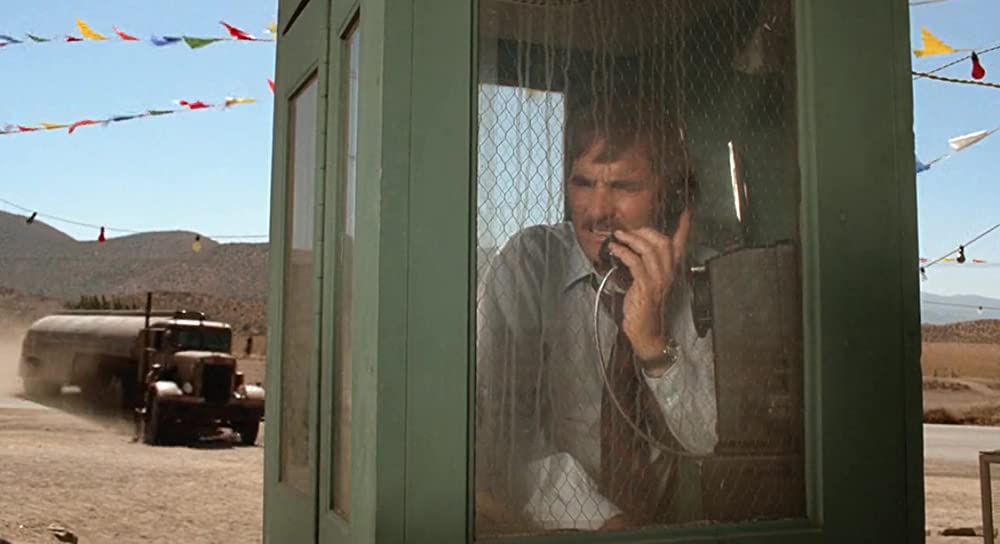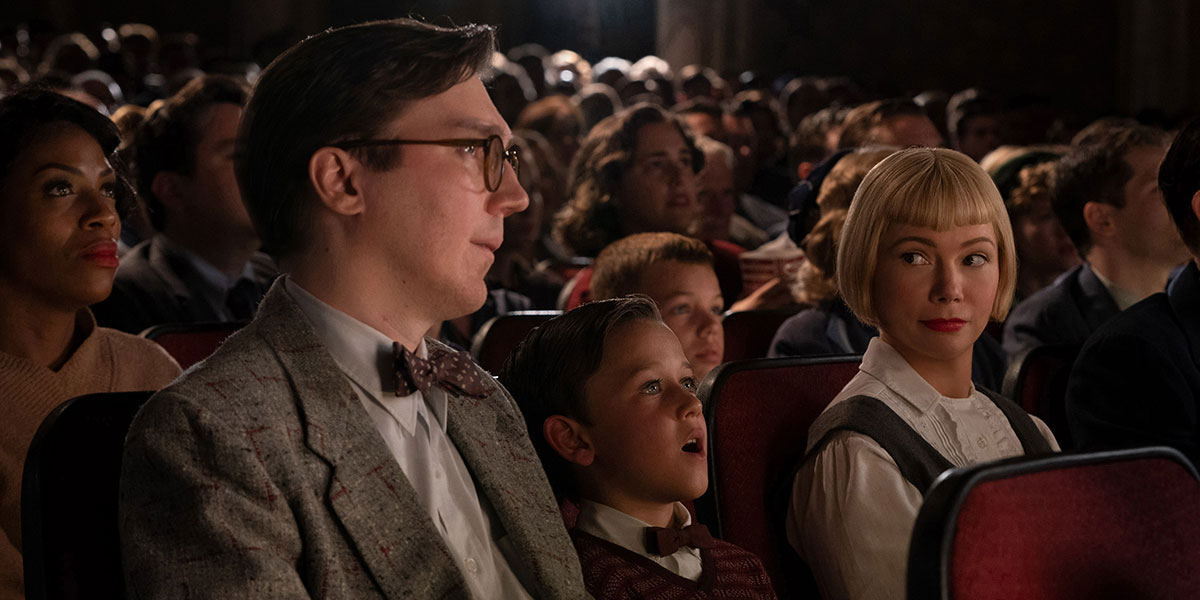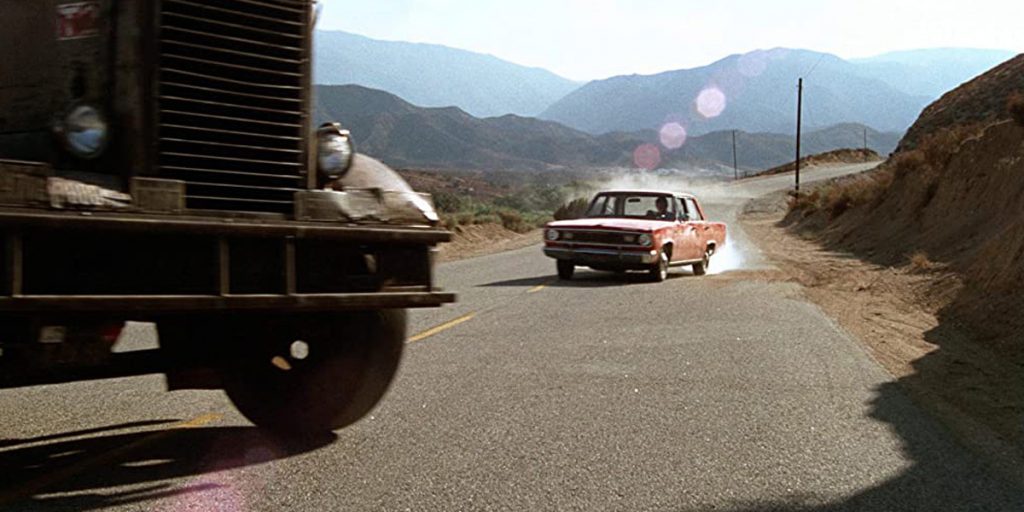Duel is one hell of a ride and Spielberg at his finest – playful, refined and above all else, entertaining.
The concept of Duel is very simple: a massive, monstrous, pollution-spewing truck driven by a faceless driver chases a normal-sized car driven by your everyman, the aptly-named David Mann (Dennis Weaver). It’s a concept so full of potential that many directors probably clamoured to get their hands on Richard Matheson’s wonderfully stripped back screenplay, but it is also a concept that in the wrong hands could have become a slog, a one-way drive to boredom. Step forward a lesser known 26 year-old, Steven Spielberg (you might have heard of him). Duel is Spielberg’s feature-length directorial debut, initially aired on television before high critical and audience praise saw it expanded to cinemas around the world. It showcases some of the best Spielbergian tropes that we have come to adore in the 50 years since and is also, by even the director’s own admission, a great companion piece to Jaws (1975). Quite simply, Duel is as refined an action thriller as you’ll ever see. It is lean, mean and Spielberg at his most playful.
It feels reductive to refer to Duel as a ‘back catalogue’ piece of work from Spielberg’s filmography, but it inevitably is, such is the expansive and acclaimed nature of said filmography. But it is also unfair to rule Duel out as a film that only Spielberg boffins should see; it is a film that can be – and was at the time of its release – enjoyed by the average audience member and someone who has maybe only seen a handful of Spielberg films. You know exactly what you’re going to get from the outset: David, a middle-aged salesman on long drive to a business meeting, overtakes a vehicular behemoth before the truck returns the favour, until David passes it once more. He leaves it behind, its horn honking, thinking nothing more of the encounter.
And so, the wondrous cat-and-mouse game is born, the truck now stalking David and his car throughout the barren desert roads of America. Dennis Weaver (Gunsmoke, McCloud) is perfectly cast as your average joe whose paranoia quickly overwhelms his early cockiness. You only know he has a wife who he phones from a gas station early on the film and that he is a salesman. The decision not to flesh out his character any further is part of Duel’s strength, allowing the action to take precedence over everything else as well as showing that David really is your normal citizen and that this scary turn of events could happen to anyone.

Four years on from Duel, Spielberg released one of his finest films and arguably the best blockbuster of all time, Jaws. There is a sumptuous moment in Duel where the parallels between the two films could not be clearer. David is parked on the side of the road just next to a tunnel, trying to help a broken-down school bus restart. The truck looms into view at the other end of the tunnel, a dark, ominous presence, its features barely distinguishable. Billy Goldenberg’s original score twangs in the background to great effect as the truck remains stationery.
Spielberg here somehow gives the truck a pair of eyes, the machine watching David like a predator watching its prey. It is a fascinating portrayal of man versus machine and this moment of the truck at one end of the tunnel watching David has deep similarities to Jaws and the shark stalking humans. Shots of the shark from afar as it stalks its prey harks back to this shot here of the truck following David, especially when it starts to move through the tunnel and towards him, much like the legendary movement of the shark fin from Jaws. In both these early films from Spielberg, he pits a leviathan (one living, one mechanical) against normal people suddenly and inexplicably in a fight for their lives. Both films are, simply put, tremendously gripping and undoubtedly scary to watch.
Spielberg’s direction and Frank Morriss’ editing ensure Duel drives forward with an unrelenting intensity which, even in its quieter moments, it never loses. Morriss’ editing is sharp and quick, enhancing the vehicular chase scenes to an excruciatingly tense level and increasing David’s fear substantially. Spielberg knows what or who to focus on at exactly the right moments, be it close-ups of David’s anxiety-riddled face, the choking smoke churning out of the exhaust pipe of the truck, low shots of the looming front / ‘face’ of the predatory vehicle, or wide shots of the chase which capture both truck and car in the frenzied pursuit. And when Duel does have its quieter moments, like when David pulls over for some food at a rest stop, Matheson’s screenplay still maintains all of this intensity with the jumbled, monologuing inner thoughts of David given as much value as the anxious silence.
In a career as varied and impressive as Spielberg’s, his greatest strength has always been to create refined thrillers or action films that above all else are entertaining. His emotional and serious work of the 1990s, like Schindler’s List (1993), or his more recent forays into the political, with films like The Post (2017) and Bridge of Spies (2015), all highlight his great diversity as a director, but it is in his most enjoyable (in the most obvious sense of the word) work that Spielberg is at his best. Films like Jaws, E.T. the Extra-Terrestrial (1982) and Jurassic Park (1993) capture the wondrous, child-like sides of our brains and thrill us even upon rewatch after rewatch. Duel is no different. It is a marvel of the action thriller genre and a film so beautifully tense and taut that it’ll keep you completely and totally gripped for all 86 minutes of its runtime.
Read our reviews of Steven Spielberg’s The Fabelmans, West Side Story, Jaws, Jurassic Park, Saving Private Ryan, Ready Player One, Schindler’s List, E.T. the Extra-Terrestrial, and The Terminal, and find out why Catch Me If You Can is a Christmas Movie.

 loudandclearreviews.com
loudandclearreviews.com
